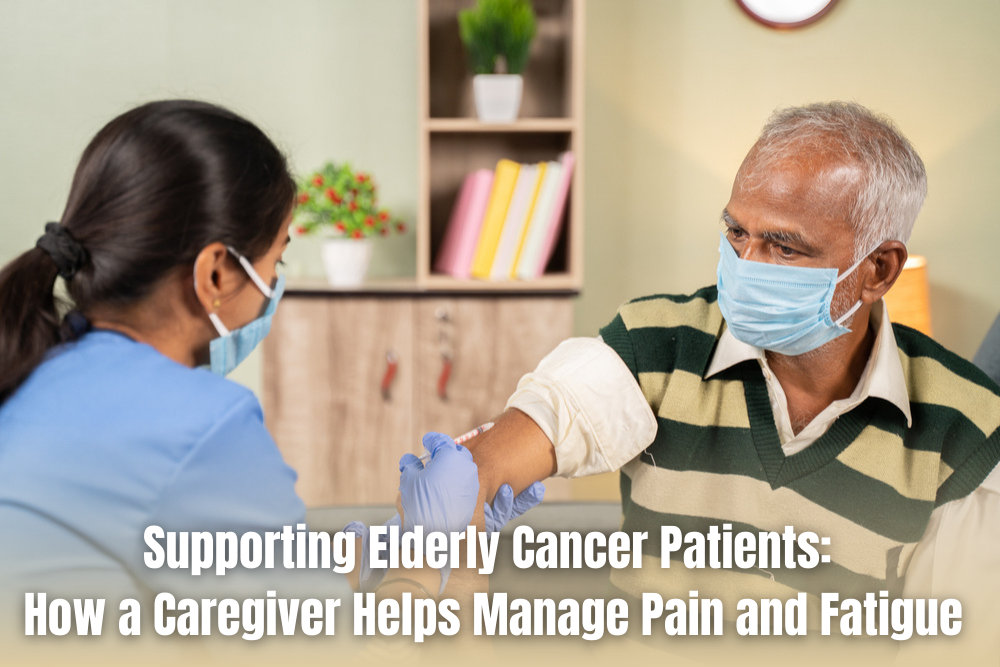Caring for an elderly parent battling cancer can be one of the toughest journeys for a family. Alongside medical treatment, day-to-day challenges like pain, weakness, and fatigue can become overwhelming. This is where having a trained caregiver makes a real difference. In this article, you’ll learn how caregivers provide support to cancer patients at home, especially in managing pain, reducing fatigue, and ensuring comfort. By the end, you’ll know exactly how professional caregiving can ease both the patient’s struggle and the family’s stress.
Understanding Pain and Fatigue in Elderly Cancer Patients
Cancer and its treatments, such as chemotherapy, radiation, or surgery, often lead to:
- Severe pain due to the disease or treatment side effects
- Fatigue and weakness, even after small activities
- Loss of appetite and nutritional challenges
- Emotional stress, including anxiety and depression
For elderly patients, these issues are even harder because their bodies take longer to recover. Families often find it difficult to provide round-the-clock care while balancing other responsibilities.
How Caregivers Help with Pain Management
A caregiver plays a hands-on role in ensuring that the patient’s pain is managed effectively. This includes:
- Medication management – giving medicines on time, as prescribed by the doctor
- Monitoring pain levels – noting changes and updating the family or doctor quickly
- Comfort techniques – helping the patient with proper positioning, massages, or use of warm/cold packs
- Reducing hospital visits – managing mild symptoms at home so the patient doesn’t have to travel unnecessarily
How Caregivers Reduce Fatigue and Weakness
Fatigue in elderly cancer patients can be both physical and emotional. Caregivers support in ways such as:
- Assisting with daily activities like bathing, dressing, or walking, without straining the patient
- Meal preparation – ensuring nutrient-rich, easy-to-digest food that boosts energy
- Encouraging light exercise – simple movements or breathing exercises to keep the body active
- Prioritizing rest – making sure the patient has a proper sleep routine and a comfortable environment
Emotional and Mental Support
Cancer affects the mind as much as the body. Caregivers help by:
- Spending quality time with the patient so they don’t feel lonely
- Listening with patience and empathy
- Supporting family members by sharing regular updates
- Creating a positive environment at home
Why Families Feel Relieved with a Caregiver
When a trained caregiver is at home, families can focus on emotional connection rather than constant medical responsibilities. Caregivers handle the practical side of care, which gives families:
- Peace of mind that their loved one is safe and comfortable
- Confidence that medicines and routines are followed correctly
- Relief from stress, knowing there’s professional support available
FAQ Section
Q1: Can a caregiver give chemotherapy at home?
No, chemotherapy should only be done at a hospital or cancer center. A caregiver can, however, support with after-care, side effects, and comfort.
Q2: How does a caregiver handle sudden pain flare-ups?
They can use doctor-prescribed quick-relief medicines, position the patient comfortably, and inform the doctor if pain worsens.
Q3: Do caregivers also help with emotional support?
Yes, apart from physical help, caregivers play a big role in reducing loneliness and giving moral support.
Q4: How do I know if my parent needs a caregiver?
If your parent struggles with daily tasks, forgets medicines, or feels unsafe alone, it’s a good time to hire a caregiver.
Conclusion
Caring for an elderly parent with cancer is emotionally draining, but you don’t have to do it alone. A trained caregiver ensures that pain, fatigue, and emotional needs are handled with compassion and professionalism. This allows families to focus on love and support while the patient receives the care they deserve.
At Shree Swami Samarth Patients Seva (SSSPS), we provide trained and dedicated caregivers who specialize in elderly cancer care. Whether it’s managing daily routines, assisting with mobility, or providing companionship, our team ensures complete support at home.


